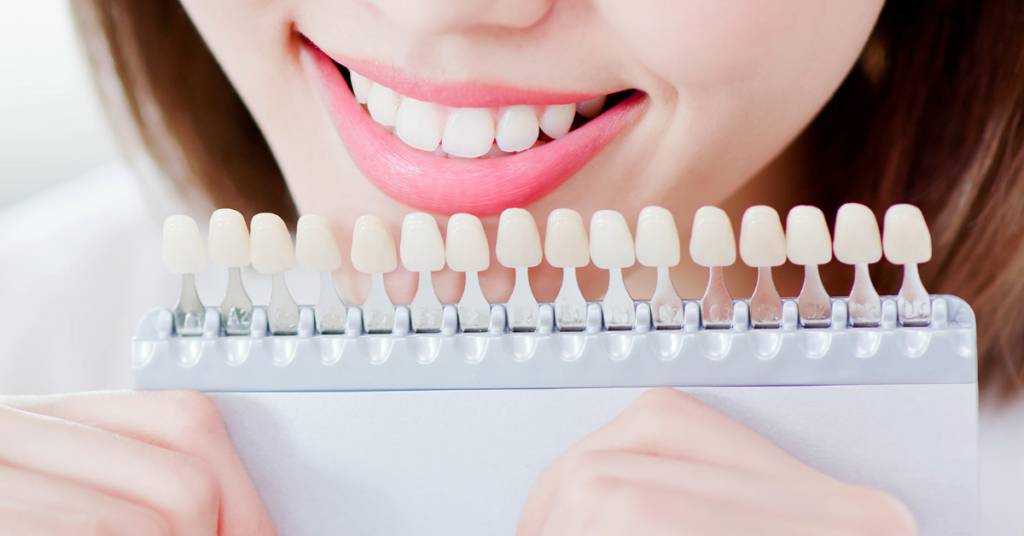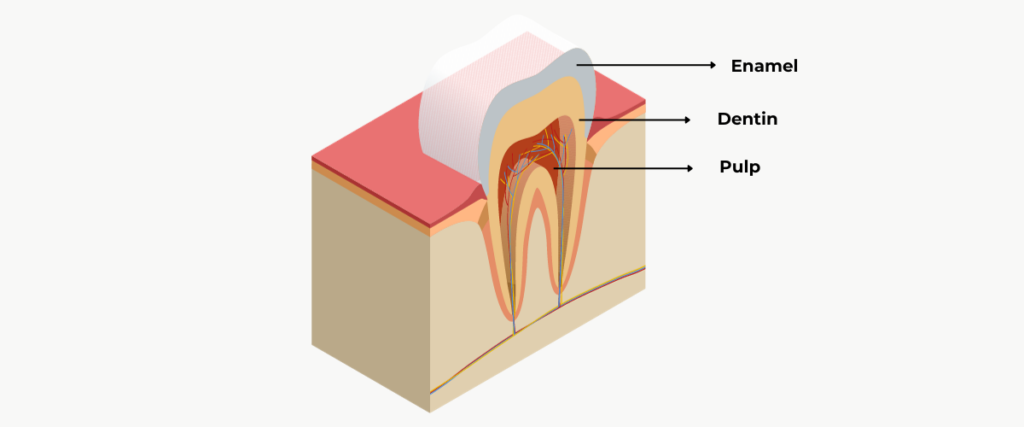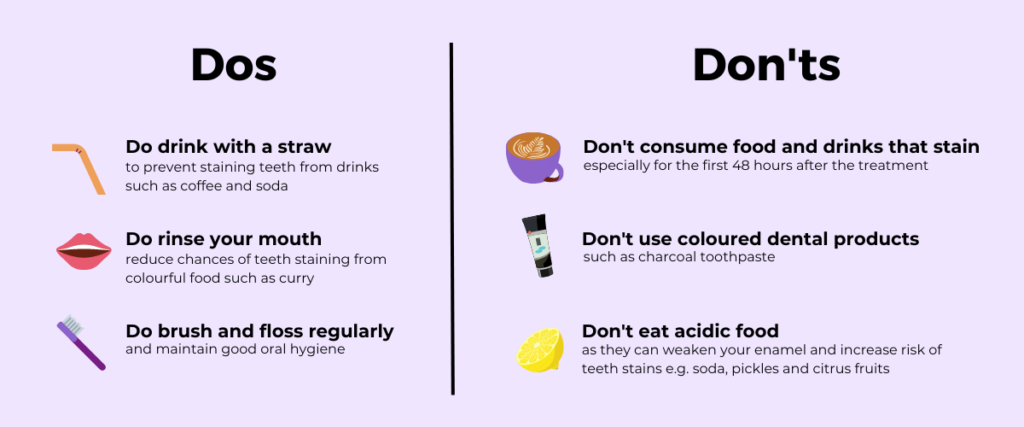Article reviewed by:
Dr Steven Soo • Prosthodontist

We love the extra boost of confidence a bright and dazzling smile can give. In addition to greater self-esteem, a study also showed that 53% of the participants with whiter teeth are perceived to have higher likeability for employment, and 58% received higher salary offers. Whiter teeth can be achieved by teeth whitening procedures.
If you’re considering whether teeth whitening is for you, read on as we answer the top 10 commonly asked questions on this topic.
- What is teeth whitening?
- What causes tooth stains?
- How does teeth whitening work?
- What are the available whitening options? Which is most effective?
- How long does teeth whitening last?
- Is teeth whitening safe?
- Does teeth whitening hurt?
- Is teeth whitening suitable for people of all ages?
- How much does teeth whitening cost?
- What are some Dos and Don’ts after whitening treatment?
What is teeth whitening?
It is a dental procedure to reduce teeth stains to a lighter shade by applying varying concentrations of whitening gel to achieve brighter smiles. Under the professional supervision of a dental specialist or dentist, it is a safe and painless procedure.
What causes tooth stains?

Tooth stains occur due to three main reasons.
- Extrinsic: Extrinsic stains affect the tooth’s outer surface, also known as the tooth enamel. Tooth enamel shields and protects the inner sensitive tooth layer called dentin. As such, the accumulation of pigmented residues causes extrinsic stains. Common culprits of such stains include coffee, tea, cola, smoking tobacco, and consumption of highly-pigmented food such as dark berries, soy sauce, and tomato-based sauces.
- Intrinsic: Intrinsic stains affect the dentin – the inner layer of the teeth. They occur much deeper than extrinsic stains, where accumulated pigmented residues work their way from within the tooth enamel. Some causes of such stains include tooth decay, excess fluoride consumption, treatment from Tetracycline antibiotics, and injury to a tooth.
- Age-related: Age-related tooth stains result from extrinsic and intrinsic stains. It may come as a shock to you, but the dentin may naturally turn yellow with age. As a result, when the tooth enamel gets thinner due to prolonged consumption of highly acidic foods, the yellowed dentin beneath eventually shows through.
How does teeth whitening work?
The treatment involves the application of hydrogen peroxide-based gel on stained teeth. As hydrogen peroxide is a bleaching agent, it breaks up the pigmentations to reduce stains and allow your teeth to appear brighter by a few shades. Based on the dental condition of your teeth, the dental specialist or dentist will advise the possible range of shades and number of cycles you require.
One thing to note is that whitening treatment will not be able to change the shade of existing fillings and crowns. If you have plans to replace a white filling or a crown, it is advisable to proceed with the replacement at least two weeks after your treatment.
What are the available whitening options? Which is most effective?
The most effective way to whiten teeth is a combination of in-clinic chairside whitening followed by at-home whitening.
In-clinic chair-side treatment
The entire treatment typically takes 1 to 1.5 hours in the clinic. A whitening gel is first applied to your teeth, followed by a whitening light to activate the whitening gel, thereby reducing teeth stains. This process can repeat up to four cycles. At Specialist Dental Group, we utilise the Philips Zoom whitening technology.
Home maintenance and touch-up kit
As the home maintenance and touch-up kit helps maximise teeth whitening results, your dental specialist may recommend that you follow up with one after an in-clinic teeth whitening treatment. The touch-up kit allows flexible adjustment of contact time between the whitening gel and your teeth so that you may attain your desired whitening shade.
The touch-up kit consists of a whitening gel, upper and lower teeth whitening trays, and a protection gel. If you happen to swallow the gel by accident, there is no cause for concern as the gel is safe if ingested.
Touch-up kits consist of whitening gels that are lower in concentration, it is therefore advisable to use them for 14 to 21 days consecutively for any visible whitening effects. In comparison to in-clinic chairside treatment, touch-up kits alone take a longer process to achieve the same whitening effect than a single in-clinic chairside treatment with professional supervision.
Teeth whitening toothpaste
Whitening toothpastes contain abrasive ingredients such as silica or alumina – which assist in removing teeth stains. That being said, it is important to select one that does not contain a high amount of such ingredients, as it can potentially damage the tooth surface and weaken your enamel. If unsure, check with your dental specialist.
How long does teeth whitening last?
The treatment generally lasts between six months to two years. That being said, the duration is largely dependent on one’s diet and lifestyle habits. It is strongly recommended that you avoid food and drinks that have intense colouring for at least 24 hours after treatment. Some examples include tea, coffee, soy sauce, wine, and berries.
To extend the longevity of your new smile, your dental specialist or dentist may propose that you explore a combination of in-clinic treatment and a take-home whitening kit.
Is teeth whitening safe?
Under professional supervision, it is a safe dental procedure. Your dental specialist or dentist will first conduct a preliminary check on the root cause of discolouration before determining your suitability for it.
Some may prefer at-home whitening as an economical way to brighten one’s teeth, as they are readily available over the counter. The downside of home whitening is the longer commitment needed to complete the whitening process – usually over a few weeks, at an hour a day to see noticeable whitening results. In addition, the trays are not custom-made and may not keep the gel in contact with the teeth effectively.
Home whitening can take longer to achieve the desired result and some over-the-counter whitening systems use incorrect chemical ingredients that can damage the enamel. Studies have also shown that approximately 7% of home whitening cases do not work.
Does teeth whitening hurt?
It should not hurt. Once you have completed the treatment, you will be able to resume your usual activities. There are, however, possible side effects to it. They include temporary sensitivity to the teeth or gum for up to 48 hours after the treatment. Manage the sensitivity by brushing your teeth with toothpaste designed for sensitive teeth and avoiding hot and cold drinks. Drinking through a straw will also help reduce hypersensitivity after the procedure.
Is teeth whitening suitable for people of all ages?
Unfortunately, not everyone is suitable for the treatment. Individuals with certain dental conditions may be advised against such treatments, especially since the procedure involves a whitening bleaching gel. They include:
- Individuals with hypersensitive teeth
- Pregnant women (including those who are currently breastfeeding)
- Individuals with allergies to the whitening bleaching gel
- Children younger than 16 years old
- Individuals with periodontal disease
How much does teeth whitening cost?
At Specialist Dental Group, our in-clinic treatment starts from $1,500 while our home maintenance and touch up kits are at $600.
| Description | Fee Range (depending on complexity) |
| Consultation and examination | $80 – 200 |
| Digital X-ray | $160 |
| Chair-side treatment | $1,500 – 2,000* |
| Home maintenance and touch up kit | $600 |
Can I use Medisave?
Medisave* does not apply to teeth whitening treatment as it does not fall under the category of dental surgery. For more details on Medisave coverage, you may visit our Medisave Page.
*Medisave is only applicable to Singaporeans and Permanent Residents of Singapore
What are some Dos and Don’ts after whitening treatment?
While teeth whitening results in a brighter set of teeth, they do not prevent future stains. To prolong your new dazzling smile, it is important to practice whitening aftercare. To prevent staining whitened teeth, you may follow these tips.

What are the Dos? ✔️
- Drink your beverages with a straw to prevent tooth stains from drinking coffee and soda.
- Rinse your mouth after every meal to reduce tooth stains from colourful food such as curry.
- Brush twice a day for two minutes each time and floss once a day to maintain good oral hygiene.
What are the Don’ts? ❌
- Don’t consume food and beverages that may stain your teeth, especially for the first 48 hours after a whitening treatment.
- Don’t use coloured dental products such as charcoal toothpaste.
- Don’t eat acidic food such as soda, pickles, and citrus fruits as they can weaken your enamel and increase the risk of teeth stains.







